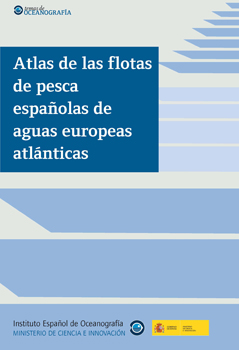
Colecciones 
Autores 
Enviar a un amigo 
Atlas de las flotas de pesca españolas de aguas europeas atlánticas
  José Castro Filiación: No disponible Biografía: No disponible Manuel Marín Filiación: No disponible Biografía: No disponible Gersom Costas Filiación: No disponible Biografía: No disponible Esther Abad Filiación: No disponible Biografía: No disponible Antonio Punzón Filiación: No disponible Biografía: No disponible Javier Pereiro Filiación: No disponible Biografía: No disponible Armando Vázquez Filiación: No disponible Biografía: No disponible |
José Castro; Manuel Marín; Gersom Costas; Esther Abad; Antonio Punzón; Javier Pereiro; Armando Vázquez Año de publicación: 2011 Idioma: Español Colección: Temas de Oceanografía eBook gratuito |
Reseña:
The European Commission has acknowledged the value of fleet-based management approaches since the 2001
Green Paper on the Common Fisheries Policy (CFP). In the 2009 Green Paper, this was again recognized as a
key area of interest for future development of the CFP, in particular setting the technical basis for the recent
Data Collection Framework (DCF), which specifies the standard for national fishery sampling programs within a
pan-European context. These policy changes require deeper and up to date knowledge about European fleets
and fisheries, thus encouraging Member States to undertake scientific projects in order to obtain appropriate
fleet segmentations classifying their fishing activities within a hierarchical structure.
The work presented in this book is the first comprehensive analysis of the Spanish fleets operating in Atlantic
European waters, taking into account both European and national management requirements. This has been
possible due to the availability of official logbooks, which provide the broadest perspective on the activity of
Spanish fleets in the study area. The only exception to this is small scale fisheries, pursued mainly by vessels of
less than 10 m of length and, therefore, not subject to the requirement of keeping logbooks.
In order to match better European and Spanish fleet classifications, a new level (“Management Unit”) is
proposed here, which is placed between “modalidad”, used in the Spanish regulations, and “métier”, as is
defined by the recent DCF.
Spanish national waters comprise four fishing grounds, two of which are in the European Atlantic. Nine
Management Units have been identified in the Northern Spanish fishing ground: bottom otter trawl (OTB10),
bottom pair trawl (PTB10), purse seine (PSN10), set long line (LLS10), set gillnet targeting hake (GNS11), set
gillnet targeting anglerfish (GNS12), trolling (LTL11) and bait-boats (LHP11) targeting albacore, and hand line
targeting mackerel (LHP12). Two Management Units have been identified in Southern Spanish waters: bottom
otter trawl (OTB20) and purse seine (PSN20).
In European waters outside Spain, six Management Units have been identified in non-Iberian waters: bottom
otter trawl (OTB50), bottom pair trawl (PTB50), set long line (LLS50) and set gillnet (GNS50) by vessels of
more than 100 GRT, and set long line (LLS60) and set gillnet (GNS60) by vessels of less than 100 GRT. Finally,
one Management Unit using bottom otter trawl has been found to operate in Portuguese waters (OTB70).
Unluckily, the analyses made on the logbooks of the Spanish fleet using drifting long line could not be used to
categorize this fleet due to the geographical limitations of the logbooks available.
After detailed analyses and categorization of the Management Units, the results obtained were used in an
exercise to test the usefulness and feasibility of using logbook information to answer some DCF requirements.
This revealed that logbooks are an essential tool to deal with bioeconomic challenges posed by the new CFP.
Más información
Descripción física del libro: 215 p. ; 135 il. ; 24 cm
ISBN: 978-84-95877-06-2
Publicación: Madrid : Instituto Español de Oceanografía : Ministerio de Ciencia e Innovación, 2011
Otros datos de interes: Copyright: Instituto Español de Oceanografía. NIPO: 473-10-003-5. Depósito Legal: M.3.985-2011 Colección Temas de Oceanografía, núm. 4. Compra de la edición impresa: IEO. Tel. 91-3421138. publicaciones@md.ieo.es. http://www.ieo.es/publicaciones/publicaciones.html
Compre este libro enEste eBook está disponible de manera gratuita |
Descargas gratuitas |
Este título está en nuestro catálogo electrónico desde el martes 28 febrero, 2012.



